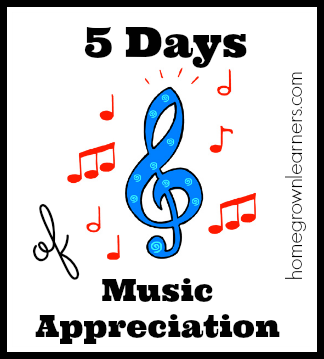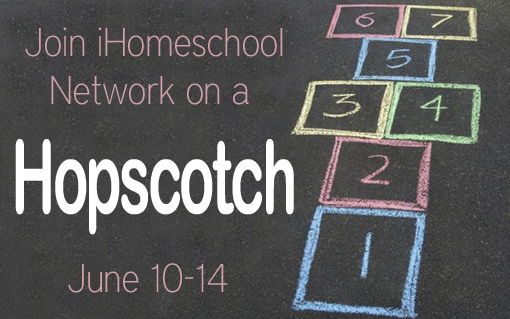
Welcome to Day 1 of The 5 Days of Music Appreciation!
Each day I will be tackling a topic (and incorporating a couple fun giveaways, too!) that will aid you in teaching music appreciation to your children.
While I am a musician, I have spoken with plenty of non musicians who tell me they just don't have the KNOWLEDGE of where to start with their children.
As with so many areas of homeschooling, I believe we're also educating OURSELVES.
My favorite book for music self education is Raising Musical Kids. This books teaches parents how to teach their children to LOVE music and also how to motivate your children to develop their own musical abilities.
So often music gets pushed to the sides in our homeschools, and this is such a shame, because it nurtures a part of our children that is so deep and meaningful. It speaks directly to their hearts and inspires beautiful thoughts and quiet contemplation.
I love the words of Jim Henson:
“Music is an essential part of everything we do. Like puppetry, music has an abstract quality which speaks to a worldwide audience in a wonderful way that nourishes the soul.”
Martin Luther, ever the master of directness, said this about music:
"I always loved music; who so has skill in this art is of good temperament, fitted for all things. We must teach music in schools; a schoolmaster ought to have skill in music, or I would not regard him."
Today I'd like to talk about how to go about beginning the study of music appreciation in your home. Let's start with a little lesson!
The Eras of Music
There are 4 basic eras of music (more if you count early music before the 1600s). For our intents and purposes we begin music appreciation in the 1600s.
(For a detailed description on these periods you can read The History of Classical Music.
Baroque : 1600-1750
Classical: 1750-1830
Romantic: 1830-1920
Modern: 1920- Present
Using The Eras of Music to Guide Music Appreciation Studies
I believe there are two logical ways to approach the study of music appreciation:
1. Study the era of music that coincides with the era you are studying in history. If you are studying the Renaissance, a survey of Baroque music would be appropriate. If you are studying the Revolutionary War era, then a study of Classical music would be in order.
OR
2. Study an era of music in depth, exposing your children to the great composers of that era. This era can be chosen at random or based on a special interest in your home. For example, last year in our homeschool we took a trip to the Oregon Trail. I wanted my children to learn about modern music and how that music was a direct reflection of the adventurous spirit of that time.
Know the Composers and their Famous Works
As you decide on an era to study, research some of the composers that were prominent during that era and their most famous pieces.
There are many sites online that will help you with this. I also love the book Classical Music: The 50 Greatest Composers and their 1,000 Greatest Works.
{It's always bothered me that we refer to all "old" music as "Classical" - because this isn't really correct, is it?}
Listen, Listen, Listen!
Whatever you do, just LISTEN to beautiful music. Even if nothing else than pulling up a "Classical" station on Pandora, it's still valuable.
Make time to incorporate a little great music each day. Maybe you want to accompany one meal a day with music or maybe you want to play music at bedtime. Choose a time of day and stick with it!
Dig Deeper and Start Teaching Music Appreciation
In my years as a classroom music teacher and now in my time as a homeschooling mom, I have found enormous value in listening to a piece and then talking about the musical elements of that piece.
Just like we read a classic novel and analyze the elements of that work, we must do the same thing with great pieces of music.
To that end, I have been working on a music curriculum that I am SO EXCITED to share with you today!!
The SQUILT Curriculum
It was put on my heart about a 6 months ago to begin writing a music appreciation course.
I wanted this course to be designed for parents who have LITTLE OR NO MUSICAL KNOWLEDGE.

Currently I have completed Volume 1: Baroque Composers, and I am working on three more volumes (Classical, Romantic and Modern).
In a volume of the SQUILT curriculum you will find 10 lessons dedicated to Super Quiet UnInterrupted Listening. Each lesson focuses on a great piece of music and guides you step by step through teaching your student about that piece.
It is a 10 week music appreciation course made EASY!
The curriculum includes notebooking pages, listening links (you don't need to purchase any music - the ebook is 100% internet linked!), informational pages about all the elements of music, coloring pages, copywork, and fun activities.
Sound good?
You can visit my new website SQUILT Music to learn more, and to purchase Volume 1.
{I'm offering the book at an introductory low price for a limited time... so if you're planning your curriculum for next year you might want to snag this!}
Do you teach music appreciation in your homeschool?
If you don't, do you mind sharing WHY? I'd love to know!
Please stay tuned for tomorrow - Day 2 of The 5 Days of Music Appreciation.
This post is part of a Summer Hopscotch from the iHomeschool Network. Visit other bloggers to read about more topics that can help you on your homeschool journey!

